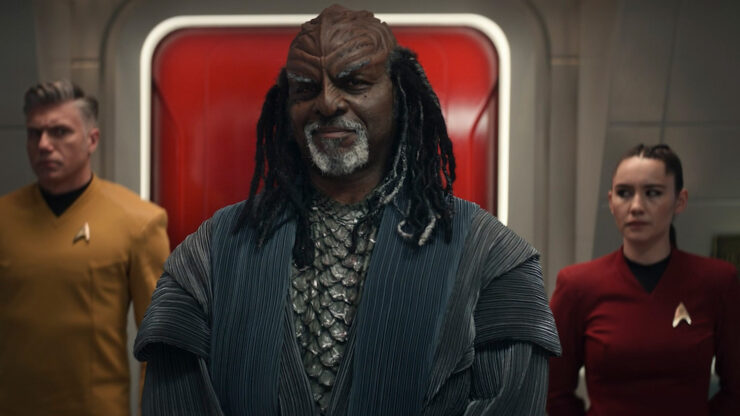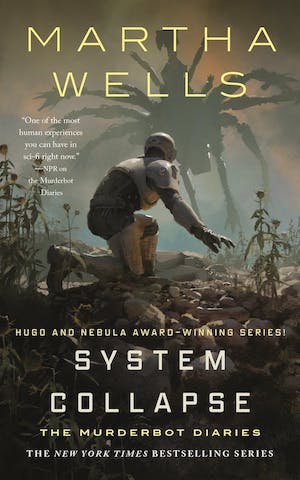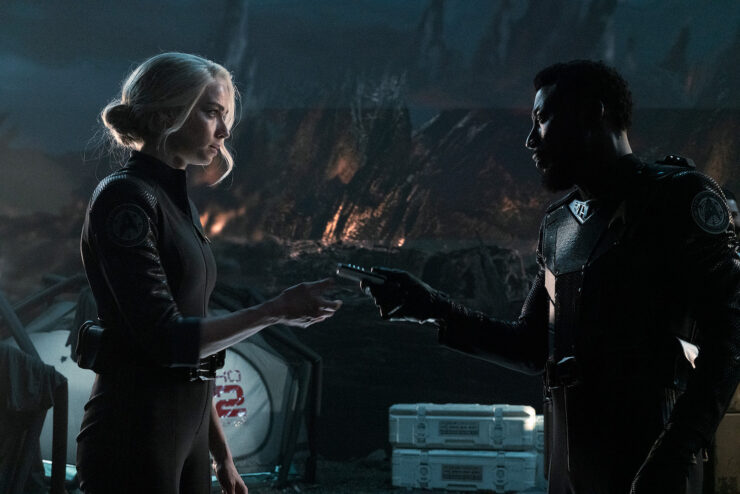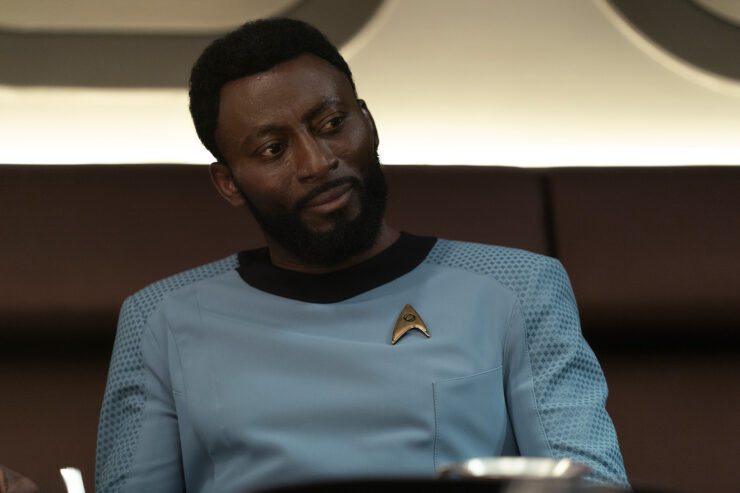The headline for this review comes, not from Star Trek, but from an episode of The West Wing called “War Crimes.” One of the many storylines in that third-season episode of the show that starred Martin Sheen as the President of the United States involved Chief of Staff Leo McGarry (the late great John Spencer) and General Alan Adamle (Gerald McRaney) discussing whether or not to convene a War Crimes Tribunal. Adamle winds up telling McGarry about a mission the latter flew in Vietnam that, unbeknownst to McGarry, targeted civilians. When angrily asking why the general told McGarry that, Adamle says quietly, “All wars are crimes.”
The latest SNW episode embodies that quote very nastily.
In “The Broken Circle,” M’Benga and Chapel injected themselves with some green goo that made them incredibly strong. They spoke of it as if it was something familiar, and it felt like an untold story.
And sure enough, it was—that bit, as well as M’Benga’s mention of the moon of J’gal in the season premiere were foreshadowing for this episode. The Klingon to whom M’Benga mentioned J’gal in “The Broken Circle” said it was impossible for him to have survived that. And he was close to correct. The world was the site of some vicious fighting during the recent Klingon-Federation war, as we see in flashbacks. Chapel and M’Benga first met there, Chapel a newly assigned nurse, M’Benga a combat medic.
These flashbacks often feel like a twenty-third-century version of M*A*S*H: “meatball surgery,” with improvised techniques due to supply limitations, and the computer intoning “incoming transport” in place of the PA guy saying, “Attention, all personnel: incoming wounded!” (or Radar saying, “Choppers!”). In particular, we see M’Benga using the technique of temporarily saving someone in the transporter buffer until they can be treated, a method we know he will use later to keep his daughter’s illness from progressing.
Plus, of course, the cliché of the young kid with whom the doctor bonds over the horrors of war, and then the kid goes back out to fight and gets killed.
There are two notable guest stars in this one, and they both elevate the already-strong material. In the flashbacks, the field hospital administrator that M’Benga and Chapel work for is played by Clint Howard. The less famous brother of director/actor Ron, this is Howard’s fifth role on Trek. He is the only actor to have appeared in all three “eras” of Trek: he played the physical form of Balok as a seven-year old in the original series’ “The Corbomite Maneuver,” and as a grown-up he appeared as a twenty-first-century homeless guy in DS9’s “Past Tense, Part II,” a Ferengi in Enterprise’s “Acquisition,” and an Orion in Discovery’s “Will You Take My Hand?”
The main guest, however, is Robert Wisdom as Dak’Rah, son of Rah’Ul. He’s the latest alumnus from The Wire to appear on Star Trek, following Idris Elba in Star Trek Beyond and Sonja Sohn in five episodes of Discovery. (The late Lance Reddick was apparently a huge Trek fan—he visited the set of the 2009 film—and I’m grumpy that they never got him on a show or movie before he died.)

Dak’Rah insists on being just called “Rah,” and he has gone from the general in charge of the forces on J’gal (earning him the title of “the butcher of J’gal”) to a defector to the Federation, serving as an ambassador who is trying now to broker peace between the two nations. Wisdom brings his usual gravitas and charisma to the role.
One thing I’ve appreciated about SNW is that it’s been both a prequel to the original series, but also a spinoff of Discovery. In SNW season one, that was mostly seen in the fallout from Discovery season two, from Pike dealing with his learning his future in Discovery’s “Through the Valley of Shadows” to the unintended consequences of the battle against Control in Discovery’s “Such Sweet Sorrow” two-parter.
This year, they’ve been mining the fact that a war with the Klingons was only three years ago for story fodder. (The “previously on” segment even includes a scene from Discovery’s first season with Klingons doing a war chant.)
And one truism about war is that there is very little truth in it. As much as violence and tactics, an intrinsic part of war is lying and deception. This episode magnificently embodies this fact in multiple ways. Some are very simple: for example, Chapel at one point says encouragingly to M’Benga, “You got this,” and M’Benga flashes back to Chapel saying the same thing to him on J’gal while they were in the operating room.
Buy the Book


System Collapse
It isn’t until later that we realize that M’Benga wasn’t remembering Chapel encouraging him in the past, it was the other way around: M’Benga was the one getting Chapel to say “You got this” as a mantra to get her over her fears that they would lose their patient.
The theme of deception runs through the entire episode, starting with the title, with the double meaning of “cloak,” both to evoke the cloaking device that has been part of Klingon tactics since The Search for Spock and to indicate things that are hidden or obfuscated.
Some deceptions are small but painful—M’Benga and Chapel pretending to be okay with attending dinner in the captain’s mess in honor of Rah. Enterprise is transporting Rah, and he’s an honored guest, so the entire senior staff is expected to attend dinner, including the chief medical officer and the head nurse.
Some deceptions are imagined—Ortegas, another veteran of the Klingon war, is absolutely convinced that Rah is faking his defection, and he’s playing a long game to gain intelligence on the Federation for the Klingons to use. (Ortegas has the same reluctance to join the dinner as the two medical staff, but she overcomes it mainly because Pike is serving jambalaya, and she can’t resist that.) Ortegas’ attitude plays into the biggest deception of war, propaganda: the other side is pure evil and our side is pure good.
Throughout the episode, we’re wondering if Ortegas is right. Rah is very much a politician, and that makes everything he says suspect, as it’s all designed to elicit a favorable response. (Wisdom plays the role superbly.) In general, Enterprise was probably a sensible choice to play ferry to Rah because—as established in Discovery’s “Brother”—the vessel was deliberately kept out of the war. Pike, Number One, and Spock didn’t serve in the conflict. So they’re more readily able to be friendly to Rah, as can Uhura, who was still at the Academy when the war happened. And longtime Trek viewers are similarly not sure because the Klingons have been both enemy and ally throughout the fifty-plus years of the franchise.
But M’Benga and Chapel in particular have bad history there. The Klingons on J’gal massacred all the inhabits of the world, civilian and Starfleet alike. All of Rah’s officers were then killed, and Rah deemed “the butcher of J’gal,” not by the Federation (as everyone probably assumed from the start of the episode), but by the Klingon Empire by way of condemning him—yet another deception. Rah, however, says that he was so outraged by his officers’ behavior that he killed them all in revenge for their horrid act. And it’s what led him to defect.

Over the course of the flashbacks, we discover that M’Benga used to be part of a sort-of special forces team, under whose auspices he developed the green go-juice from “The Broken Circle.” In the flashback, M’Benga insists to the Andorian CO of the team—who is trying to recruit M’Benga—that that’s not who he is anymore, he’s a physician now. This is a fascinating revelation, as we know from “Among the Lotus Eaters,” that M’Benga doesn’t like being thought of as someone who is capable of violence, despite his martial arts training, and we know from the original series’ “A Private Little War,” where the character was introduced, that he interned on Vulcan. He may well have chosen to intern there specifically to move away from his violent past.
But that past comes back to haunt him on J’gal, as the entire team is killed.
Eventually, the truth comes out. The order to kill everyone on J’gal, even civilians, did indeed come from Rah. And the slaughter of all the officers was at the hands, not of Rah, but of a go-juice-enhanced M’Benga, who used a Klingon d’k tahg on each of the Klingons he encountered in revenge for his erstwhile comrades and patients being killed. But Rah escaped, and later he was tarred with the brush of the massacre—and used it to further a political career as a Federation diplomat, since his status as a Klingon general irrevocably destroyed.
The episode ends with a confrontation between M’Benga and Rah in sickbay, the second such in the episode—the first came in the gym, as the two sparred while each is wearing a purple marital arts gi. Rah wants M’Benga by his side as he argues for peace, as a symbol of unity between the two formerly warring factions. M’Benga wants nothing to do with that.
But M’Benga is the true butcher of J’gal, and he still has the d’k tahg he used that fateful day. And he uses it again on Rah. The story he tells La’an and Pike is that Rah attacked him, and M’Benga was able to turn his d’k tahg on him. And he can easily “prove” that it’s Rah’s d’k tahg, because it still has the blood of the Klingons who died at the hands of the butcher of J’gal on it. And since everyone knows that Rah is the butcher of J’gal…
M’Benga is turning into a fascinating—and not very pleasant—character. First he hid his daughter in the transporter buffer without telling anyone, and now he’s proven to have major PTSD to the point of murder. This is not a stable individual, and I hope that this is eventually dealt with, as M’Benga needs to find his way back to sanity and to redemption.
The acting in this is stellar, from the great guest acting by Howard as an eccentric administrator, to Ethan Peck’s Spock trying so very hard to empathize with and provide comfort to Chapel and finding it impossible, to Rebecca Romijn’s Number One doing the first officer thing and insisting that Pike make a course correction that will end the mission sooner, because Rah’s presence on board is torpedoing morale.
But the rock stars here are Wisdom, Babs Olusanmokun, and Jess Bush. Wisdom gives a tour de force, striking a balance between a warrior’s blustery attitude and a politician’s changeable façade. (Robert O’Reilly also did that Klingon two-step superbly as Gowron on TNG and DS9.) And the pain is etched on every pore of Olusanmokun’s and Bush’s faces throughout.
In the end, everyone loses. M’Benga loses more of his soul, Rah loses his life, and the Federation loses an important diplomatic ally. Which is what happens in a war.
Because all wars are crimes.
Keith R.A. DeCandido will be in Booth 243 of the exhibit hall at GalaxyCon Raleigh this weekend in North Carolina, where he’ll be selling and signing his books and comics, as well as some hand-made stuffies created by his wife Wrenn Simms. Come by and say hi!










